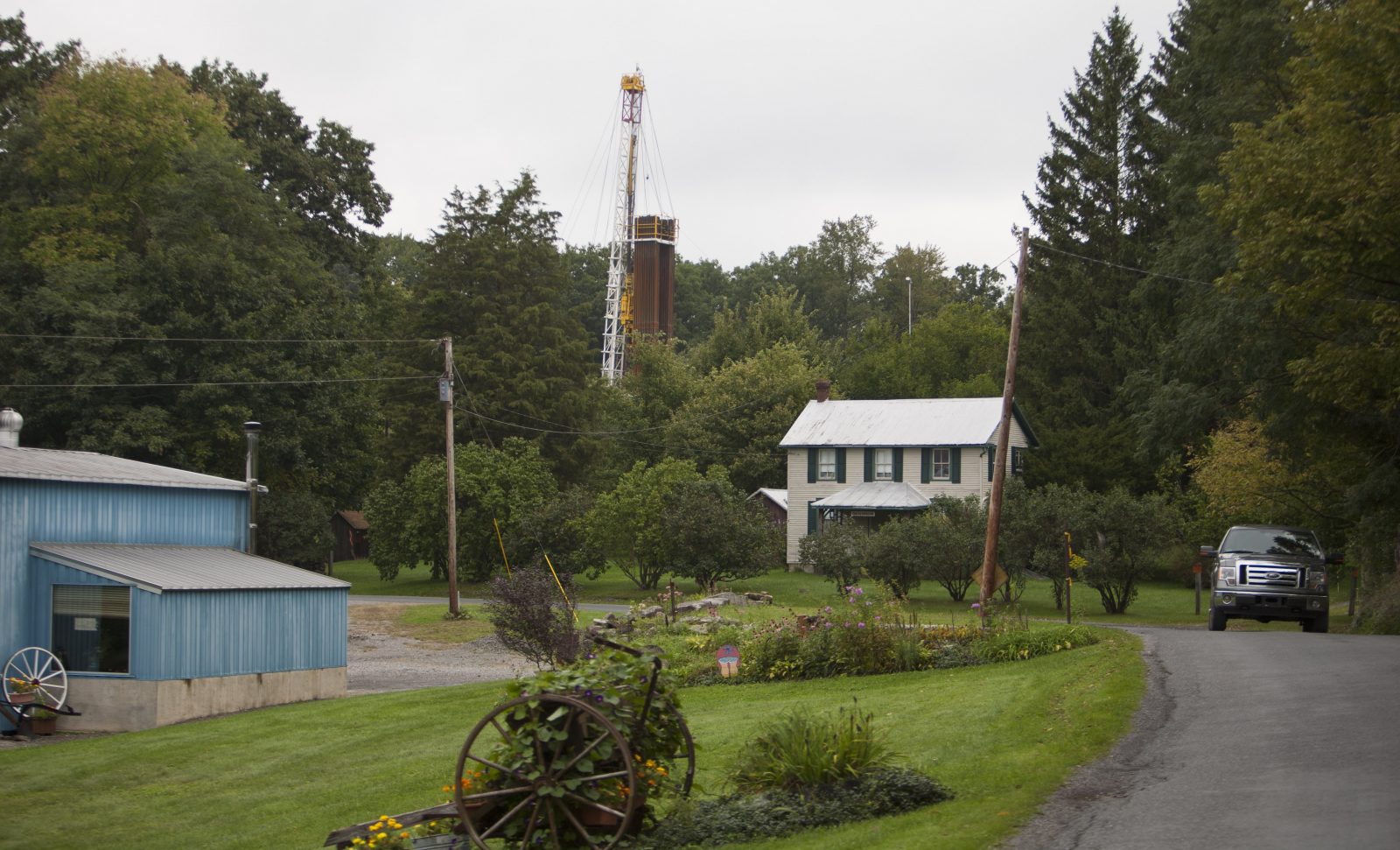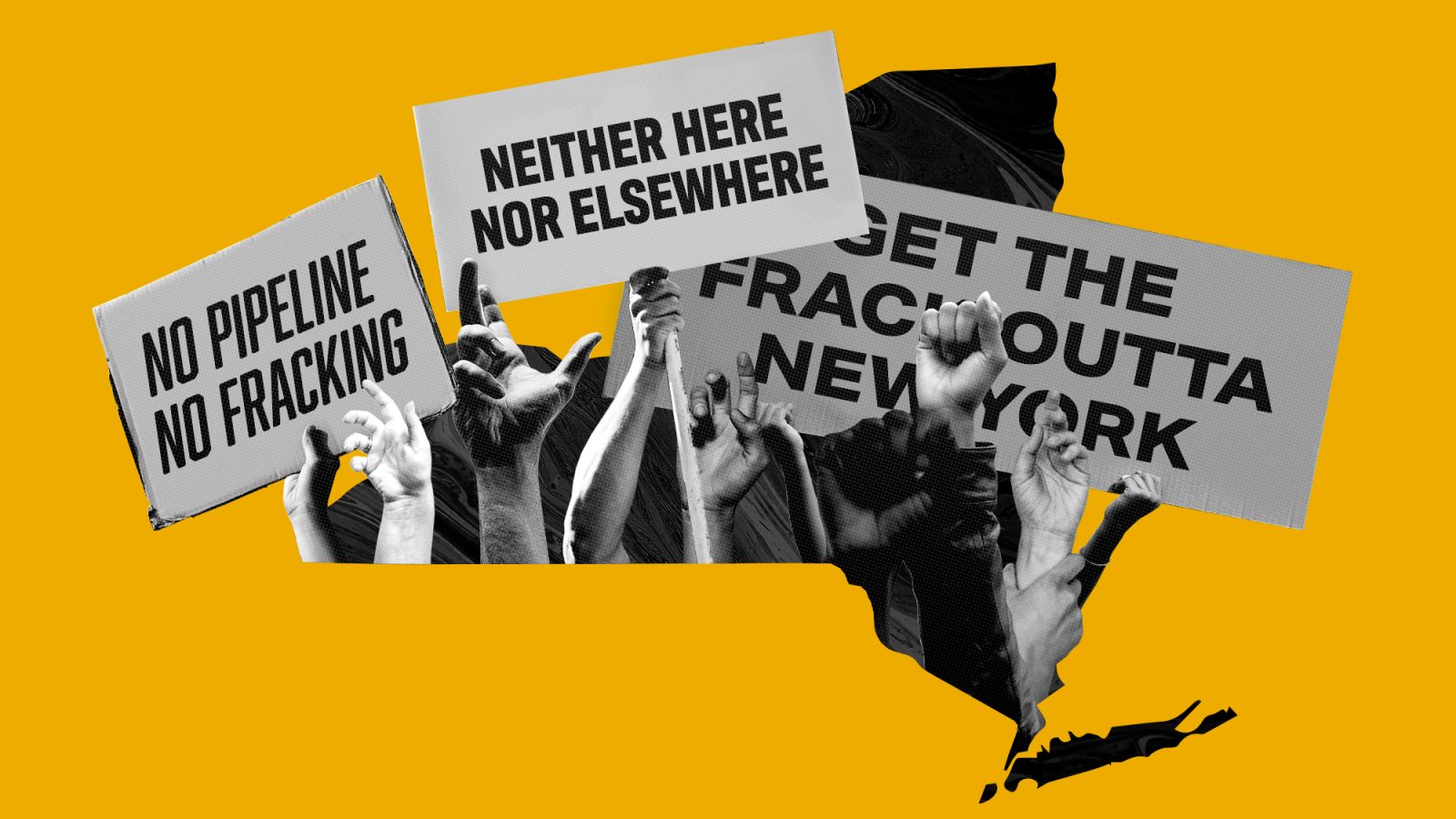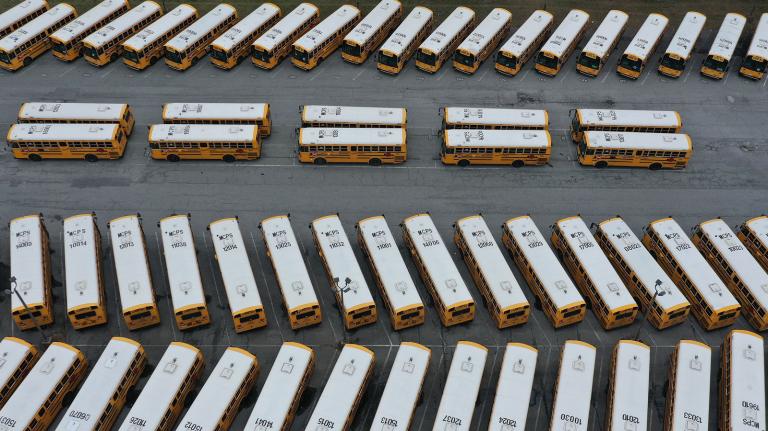Colin Jerolmack is a professor of environmental studies and sociology at New York University and the author of Up to Heaven and Down to Hell: Fracking, Freedom and Community in an American Town (Princeton University Press, April 2021).
Scott McClain, a retired game warden, lives on a secluded five-acre homestead nestled at the base of a densely wooded mountain in the Appalachian foothills of north-central Pennsylvania. A hunting camp sits at the summit. To be neighborly, McClain granted the camp permission to use his driveway and extend it up the mountain in 2002.
He came to regret that decision years later when the camp leased its mineral rights for shale gas drilling and allowed a petroleum company to use his driveway. Hundreds of earthmovers and big rigs began going up and down the gravel access road, just yards from Scott’s house. His chimney collapsed from the reverberations. McClain begged the camp to deny the gas trucks access on the grounds that it was destroying his home and was against the spirit of the legally binding easement he granted. But camp owners, on their way to becoming “shaleionaires,” ignored his pleas. The caravans were relentless. His home’s foundation cracked.
America is the only country in the world where property ownership commonly extends well above and below the land’s surface. So once McClain granted the easement, it was the camp’s right to use the driveway however it pleased. Property rights aren’t typically the focus of anti-fracking activism, but they shouldn’t be overlooked: Three out of every four acres leased or sold for oil and gas drilling in the U.S. are privately held.
Inspired by the philosopher John Locke’s declaration of private property as a “natural right,” 18th-century English common law — which governed property rights in the American colonies — decreed that land ownership reached “up to heaven and down to hell.” But there was a huge asterisk: The Crown retained rights to all subsurface oil, gas, coal, gold, and silver. So in throwing off the yolk of imperial oppression, America’s founding fathers were determined to heed Locke’s admonition that the state should “never have a power to take to themselves the whole or any part of the subject’s property, without their own consent.” By making ownership of those underground resources absolute, the U.S. Constitution limited government’s ability to hoard the fruits of private industry.
Mineral-rights ownership, as it is called, has enormous, if often ignored, consequences for the politics of fracking in America. It means that the decision to extract gas and oil from the land beneath our feet — an act that impacts the well-being of our communities and our planet — is largely a choice that thousands of ordinary people make without the consent of their neighbors, let alone future generations.
In most countries, decisions about oil and gas drilling aren’t made by private citizens. Instead, the government retains the mineral rights, leaving only the surface to private owners, and decides whether developing them is in the public interest.
States can ban fracking; New York did in 2014. (A number of cities and towns have tried to implement local bans, though they’ve faced stiff court challenges from the industry and their own state governments.) But most states treat land sovereignty as akin to free speech — as in, it’s nobody else’s business whether or not you lease your property. That’s a false equivalence. Exercising one’s mineral rights inevitably infringes on others’ rights — to their own life, liberty, and property.
People living near oil and gas infrastructure are getting sick from chemical exposure. Many deal with incessant truck traffic, flares that roar like a jet engine and blot out the stars, malodorous toxic fumes, and so on. One couple I know in Hughesville, Pennsylvania, has been living without potable water ever since a gas well was drilled on their neighbor’s property 10 years ago.
Of course, the people most vulnerable to climate change and other environmental hazards involuntarily bear the costs of lessors’ decisions too, even if they live far from the points of extraction. Communities of color from the Brownsville neighborhood in Brooklyn, New York, to the Standing Rock Reservation live with the possibility that fracked gas and oil pipelines — imposed upon them without consultation — will poison the air they breathe and the water they drink.
Most of the policy levers that environmentalists have reached for to limit the environmental harms of fracking have proven ineffective. The federal government plays almost no role in regulating the industry. Progressives have called on President Biden to ban fracking, but he can’t, except on federal public land. The infamous exemption of fracking fluids from the Safe Drinking Water Act (aka, the Halliburton Loophole) strips the Environmental Protection Agency of the legal authority to regulate the toxic water injected underground to frack wells. Hazardous air emissions from fracked wells are, preposterously, exempt from the Clean Air Act, which means that they are essentially unregulated.
Meanwhile, in oil- and gas-friendly states like Pennsylvania, environmental regulators take little interest in punishing industry malfeasance. Inexplicably, the Pennsylvania Department of Environmental Protection rescinded the $8.9 million fine it had levied against the energy company that contaminated a creek and six private water wells in Hughesville, even though the water still gurgles with methane. A subsequent grand jury investigation concluded that the DEP failed to protect the safety of its citizens. In sum, there are insufficient governmental restrictions in place to prevent or ameliorate the public spillover effects of fracking on private land.
To protect people’s well-being and civil liberties, we need to curtail property rights. This is not as un-American as it may sound. In fact, it’s done all the time: Zoning ordinances, permits, restrictive covenants, and easements all restrict individuals’ land sovereignty. In humble town halls around the country, communities routinely come together to deliberate whether a restaurant ought to be granted a liquor license, or whether the construction of a parking lot or a cell tower is consistent with local zoning. This is democracy in action, consistent with Locke and even supported by some libertarian thinkers like Robert Nozick, who argues that “the position of others” ought not be “worsened” by private land-use decisions.
Many towns across America have attempted to use the tools of local government to balance property rights and the commonwealth to limit the harms of fracking. Perhaps surprisingly, many of them are in conservative-leaning rural areas. Some, like Grant Township in Pennsylvania, are finding novel ways to win. After the DEP granted a permit for a fracking wastewater-injection well in the area, residents created a “Home Rule Charter” that bans such wastewater injection. The DEP at first sued the township, but eventually it desisted and revoked the permit on the grounds that it would violate local law.
Most major oil- and gas-producing states, including Pennsylvania, Texas, Colorado, North Dakota, and Louisiana, recognize home rule: Towns are free to draft their own constitutions and ordinances. At the same time, conservative legislatures have overturned local fracking bans and rescinded the right of communities to use zoning to control or limit fracking. But these efforts are judicially dubious. In 2012, Pennsylvania passed a law that preempted local zoning, but the state Supreme Court declared the provision unconstitutional in a lawsuit brought by Robinson Township and six other municipalities.
The Pennsylvania victories suggest that activists could work with communities to enact and litigate local land-use ordinances to rein in the harms of fracking. Only about 3 percent of Pennsylvania’s more than 2,500 municipalities have voted to create home-rule charters. Encouraging more towns to adopt local constitutions also has the potential to convince small-town conservatives, who tend to favor local autonomy over bureaucratic control. It turns out that many are willing to accept property restrictions, so long as they get to help make the rules.
Had the Pennsylvania Supreme Court decision come down before the gas trucks invaded Scott McClain’s driveway, he may have been able to petition his township supervisors to deny the petroleum company permission to drill next door or use his driveway. He eventually won a small settlement from the energy firm responsible for contracting the gas trucks, but he says it wasn’t nearly enough to recoup the cost of repairing the structural damage to his house. Gas trucks can still use his driveway. (Even if McClain’s township decided to adopt a home-rule charter, it’s not clear that it could rescind permits that have been executed.) As much as McClain values land sovereignty, he’s come to believe that he should have a say in how others use their property if it impacts him. That’s democracy.




